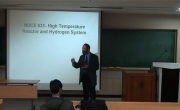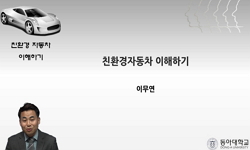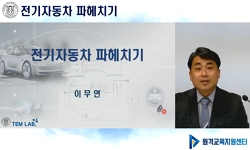The fast evolving Electric vehicles (EVs) have become popular due to their zero-emission, fuel economy and better technology. However, the performance and life of batteries are very sensitive to temperature, it is important to maintain the proper temp...
http://chineseinput.net/에서 pinyin(병음)방식으로 중국어를 변환할 수 있습니다.
변환된 중국어를 복사하여 사용하시면 됩니다.
- 中文 을 입력하시려면 zhongwen을 입력하시고 space를누르시면됩니다.
- 北京 을 입력하시려면 beijing을 입력하시고 space를 누르시면 됩니다.


Performance Evaluation of Battery Thermal Management System in Electric Vehicle Using Induction Heater (Part 1: Parallel System)
한글로보기https://www.riss.kr/link?id=A106640032
-
저자
Waseem Raza (Jeju National University) ; Gwang Soo Ko (Jeju National University) ; 박윤철 (제주대학교)

- 발행기관
- 학술지명
- 권호사항
-
발행연도
2020
-
작성언어
English
- 주제어
-
등재정보
KCI등재,SCOPUS,ESCI
-
자료형태
학술저널
- 발행기관 URL
-
수록면
1-7(7쪽)
-
KCI 피인용횟수
0
- DOI식별코드
- 제공처
-
0
상세조회 -
0
다운로드
부가정보
다국어 초록 (Multilingual Abstract)
The fast evolving Electric vehicles (EVs) have become popular due to their zero-emission, fuel economy and better technology. However, the performance and life of batteries are very sensitive to temperature, it is important to maintain the proper temperature range. The battery thermal management system (BTMS) plays an important role in the performance of EVs. In this context, this study is conducted to evaluate the thermal performance of a battery with a parallel system using an induction heater. The GT-Suite software is used for simulation and evaluation. Mixture of water and ethylene glycol 50:50 is used as a working fluid and controlled by pump and valves. The heating rate of battery was analyzed by changing the capacity of induction heater 2, 4 and 6 kW and the flow rate of fluid was 2, 3, 5, 7, 10 and 27 LPM. The simulation work predicts that the battery heating rate increases with the increase in fluid flow. The study concluded that the battery heating rate is maximum with a flow rate of 27 LPM which is the highest amount of LPM, indicating that the rise in flow rate causes the increase in heating rate of the system which is also affected by induction heater capacity.
참고문헌 (Reference)
1 J. Yi, "Three-dimensional modeling of the thermal behavior of a lithium-ion battery module for hybrid electric vehicle applications" 7 : 7586-7601, 2014
2 D. Adair, "Thermal Management of Li-ion Battery Packs" 18167-, 2014
3 S. Oberthur, "The New Climate Policies of the European Union: Internal Legislation and Climate Diplomacy"
4 J. Acero, "Quantitative evaluation of induction effciency in domestic induction heating applications" 49 : 1382-1389, 2013
5 H. P. J, "Policy Options to Reduce Passenger Cars CO2 Emissions After 2020" ECN 2013
6 P. Urbanek, "Magnetic flux and temperature analysis in induction heated steel cylinder" 30 (30): 3328-3330, 1994
7 International Energy Agency, "IEA"
8 H. Kagimoto, "Effect of temperature dependence of magnetic properties on heating characteristics of induction heater" 46 : 3018-3021, 2010
9 A. Boadi, "Designing of suitable construction of high-frequency induction heating coil by using finite-element method" 41 : 4048-4050, 2005
10 J. Li, "Battery thermal management system of electric vehicle" 42 : 2014
1 J. Yi, "Three-dimensional modeling of the thermal behavior of a lithium-ion battery module for hybrid electric vehicle applications" 7 : 7586-7601, 2014
2 D. Adair, "Thermal Management of Li-ion Battery Packs" 18167-, 2014
3 S. Oberthur, "The New Climate Policies of the European Union: Internal Legislation and Climate Diplomacy"
4 J. Acero, "Quantitative evaluation of induction effciency in domestic induction heating applications" 49 : 1382-1389, 2013
5 H. P. J, "Policy Options to Reduce Passenger Cars CO2 Emissions After 2020" ECN 2013
6 P. Urbanek, "Magnetic flux and temperature analysis in induction heated steel cylinder" 30 (30): 3328-3330, 1994
7 International Energy Agency, "IEA"
8 H. Kagimoto, "Effect of temperature dependence of magnetic properties on heating characteristics of induction heater" 46 : 3018-3021, 2010
9 A. Boadi, "Designing of suitable construction of high-frequency induction heating coil by using finite-element method" 41 : 4048-4050, 2005
10 J. Li, "Battery thermal management system of electric vehicle" 42 : 2014
11 A. A. Pesarane, "Battery thermal management in EV and HEVs: Issues and solutions" 43 : 34-49, 2001
12 Z. Rao, "A review of power battery thermal management" 15 : 4554-4571, 2011
13 Q. Wang, "A critical review of thermal management models and solutions of lithium-ion batteries for the development of pure electric vehicles" 64 : 106-128, 2016
14 T. M. bandhauer, "A critical review of thermal issues in lithium-ion batteries" 158 : R1-R25, 2011
동일학술지(권/호) 다른 논문
-
Rheology of Ice Slurry in Circular Pipe at Different Freezing-Point Depressants
- 대한설비공학회
- Fajri Ashfi Rayhan
- 2020
- KCI등재,SCOPUS,ESCI
-
A Uniquely Finned Tube Heat Exchanger Design of a Condenser for Heavy-Duty Air Conditioning Systems
- 대한설비공학회
- Ahmad M. Abubaker
- 2020
- KCI등재,SCOPUS,ESCI
-
- 대한설비공학회
- Sampath Suranjan Salins
- 2020
- KCI등재,SCOPUS,ESCI
-
Study on the Conceptual Design of a Solar Ejector Refrigeration System
- 대한설비공학회
- Md Khairul Bashar Shovon
- 2020
- KCI등재,SCOPUS,ESCI
분석정보
인용정보 인용지수 설명보기
학술지 이력
| 연월일 | 이력구분 | 이력상세 | 등재구분 |
|---|---|---|---|
| 2023 | 평가예정 | 해외DB학술지평가 신청대상 (해외등재 학술지 평가) | |
| 2020-01-01 | 평가 | 등재학술지 유지 (해외등재 학술지 평가) |  |
| 2013-01-01 | 평가 | 등재 1차 FAIL (등재유지) |  |
| 2010-01-01 | 평가 | 등재학술지 선정 (등재후보2차) |  |
| 2009-01-01 | 평가 | 등재후보 1차 PASS (등재후보1차) |  |
| 2008-01-01 | 평가 | 등재후보학술지 유지 (등재후보1차) |  |
| 2006-01-01 | 평가 | 등재후보학술지 선정 (신규평가) |  |
학술지 인용정보
| 기준연도 | WOS-KCI 통합IF(2년) | KCIF(2년) | KCIF(3년) |
|---|---|---|---|
| 2016 | 0.56 | 0.56 | 0.48 |
| KCIF(4년) | KCIF(5년) | 중심성지수(3년) | 즉시성지수 |
| 0.4 | 0.34 | 0.535 | 0.11 |




 KCI
KCI






